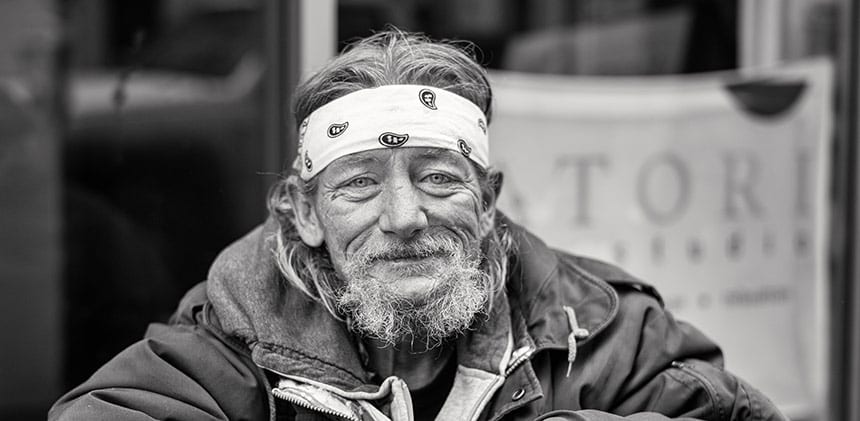
By Andrew Cohen
The first major study of California’s Business Improvement Districts shows that they are increasingly targeting homeless people and excluding them from public spaces.
Conducted by Berkeley Law’s Policy Advocacy Clinic on behalf of the Western Regional Advocacy Project, the study details how BIDs have proliferated with little oversight, sometimes violate California law, and infringe on homeless people’s legal rights.
A popular urban revitalization tool, BIDs are public-private financing entities that serve the interests of business and property owners. Usually located in downtown areas with a heavy business concentration, California BIDs collect and spend hundreds of millions of dollars annually—some of which comes from taxpayers through publicly owned property.

“Like other urban renewal efforts, BIDs were supposed to help fill the government resource and service void,” says clinic Faculty Director Jeffrey Selbin. “But researchers and policymakers have paid little attention to the rise of BIDs and their actual influence on municipal and state affairs.”
The study found that BIDs use their expanded power and resources to advocate for policies and engage in policing practices aimed at driving homeless people out of their districts. That includes efforts to enact, preserve, and bolster laws that punish activities such as sitting, resting, and sleeping that homeless people need to do in public.
“This groundbreaking study is a much needed resource since the state does not even bother to track BIDs, how much money they spend, from what sources, and for what purposes,” Western Regional Advocacy Project Executive Director Paul Boden said in a statement. He added that BIDs seek “to erase from cities any sign of vast inequality while at the same time perpetuating it.”
The study was released today at coordinated press conferences in San Francisco, Los Angeles, Denver, Sacramento, and Portland.
Growing, unchecked power
Funded by local property assessments, BIDs have expanded dramatically since 1994, when the California State Legislature loosened public oversight. That allowed cities to contract the management of BIDs to private nonprofits and expanded their authority to raise and spend property assessment revenue.

The study notes how that legislative action triggered a spike in California’s anti-homeless ordinances, as BIDs pressed state and local lawmakers to criminalize homelessness. These districts also routinely use their own private security and work closely with local police to enforce anti-homeless laws and otherwise exile homeless people from their boundaries.
“BIDs are spending millions of dollars in property tax revenue to transform city centers in a way that harms the state’s most vulnerable residents, yet your average Californian likely has no idea what a BID is,” laments study researcher Joshua Epstein ’17. “As our team’s understanding of BIDs deepened, we were struck as much by their power as the hiddenness of the infrastructure behind it.”
Berkeley Law and public policy students surveyed roughly 200 BIDs in California’s 69 largest cities. They also conducted in-depth case studies of 11 BIDs in Berkeley, Chico, Los Angeles, Oakland, Sacramento, San Diego, and San Francisco—scrutinizing public records, surveying homeless people, and interviewing BID officials.
“The most disturbing information we found was the level of public money that BIDs receive through assessments,” says Shelby Nacino ’18, who spent two years working on the study.

Noting that San Francisco’s Civic Center Community Benefit District obtains more than half its assessment revenue from publicly-owned properties, she adds,“This means that taxpayer funds are being used to support the priorities of those property owners and business owners who established the BID.”
Wide-ranging harms
The study found that BIDs negatively affect homeless people in three main ways:
- They advocate for a legal framework that stigmatizes homeless people by backing laws that punish them for engaging in unavoidable, life-sustaining behaviors and by opposing civil rights legislation that would decriminalize such activities.
- They enforce anti-homeless laws by deploying private security forces and collaborating with police departments (“although at times, BID law ‘enforcement’ appears untethered from actual law and more resembles harassment,” Epstein says).
- Although BIDs often trumpet their efforts to connect homeless people with services, some have sought to push shelters and service providers out of their boundaries, and homeless people often experience their interactions with BID employees as another form of surveillance and harassment.
Among its recommendations, the study urges lawmakers to rein in BID assessment and spending authority by banning anti-homeless advocacy and policing and ending taxpayer funding. Other proposals include increased oversight and regulation of BIDs by city governments, and disestablishing BIDs that unlawfully harm the homeless.
The report concludes by calling on BIDs themselves to work toward solutions instead of trying to exclude homeless people from their districts.
“Property and business owners might see area sweeps and policing of homeless folks as conducive to their goals of having ‘cleaner’ and ‘safer’ streets,” Nacino says. “These actions harm those homeless people and other vulnerable residents who are directly targeted as the problem, and don’t provide long-term housing or other social services resources. Rather, they condemn the very existence of certain people in public spaces when these people have nowhere else to go.”